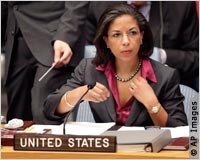14 April 2009
United States Praises U.N. Security Council Action on North Korea

Washington — The U.N. Security Council has unanimously condemned North Korea for its recent launch of a three-stage Taepodong-2 missile into the Pacific Ocean and pledged strengthened sanctions against the country for violating a 2006 council resolution.
“The president welcomes today’s clear and united message by the United Nations Security Council condemning North Korea’s recent launch,” according to an April 13 White House statement.
The actions by the Security Council confirm that North Korea violated international law, and that violation will result in substantial consequences, White House press secretary Robert Gibbs said.
“The international community is united in demanding that North Korea abandon its pursuit of weapons of mass destruction and their means of delivery, and that it refrain from further provocations,” the statement says. The United States will continue working through the Six-Party Talks on these goals, it says.
The Six-Party Talks, led by China, also include North Korea, South Korea, Japan and Russia.
U.S. Ambassador Susan Rice praised the Security Council for the leadership demonstrated by Mexico’s U.N. Ambassador, Claude Heller, the current council president. She said the council agreed that North Korea has violated U.N. Security Council Resolution 1718, which forbids North Korea from testing missiles and nuclear weapons. The 2006 resolution came after North Korea conducted a nuclear test.
“It clearly demands that there will be no further launches, and through the mechanism of the existing sanctions regime under 1718 allows for the substantial strengthening and augmentation of that regime,” Rice, who is the U.S. representative to the United Nations, said after the Security Council took action April 13 in New York.
North Korea launched a Taepodong-2 missile, with a projected range of 6,700 kilometers, April 5. The range would pose a direct threat to Alaska, Hawaii and most of East Asia. While North Korean officials claimed the missile launched a communications satellite into orbit around the earth, the U.S. North American Aerospace Defense Command reported that the three-stage missile separated over the Pacific and fell into the ocean along with its payload.
The 2006 resolution requires North Korea to suspend all ballistic missile testing and “abandon all nuclear weapons and existing nuclear programs in a complete, verifiable and irreversible manner.”
The Security Council statement calls for the committee monitoring sanctions against North Korea to report to the council by April 24 on companies, items and technologies to be added to a list of items currently banned. If the committee does not report to the council, then the council will develop its own list by April 30.
What foreign affairs decisions should President Obama consider? Comment on America.gov's blog.
